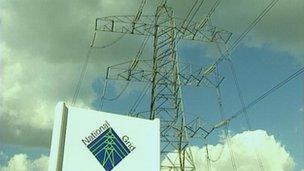Ofgem study 'undermines' case for nuclear
- Published

The study considered the impact of sharing the costs of national grid access equally across the UK
Plans being considered by the industry regulator could undermine the prospect of new UK nuclear power plants.
The cost of feeding the north of Scotland's renewable energy into the national power grid could fall by 80% under the proposals.
A study carried out for Ofgem suggested the change would boost the case for building wind and marine turbines in and around Scotland.
The costs were estimated in a draft pricing and investment model.
It suggested the access charge for wind and marine power from the north of Scotland would fall from £24 per kilowatt to less than £5.
Sharing the costs equally across the UK would remove the financial incentives to build any new nuclear power stations, and shift a projected £17bn of nuclear investment to other technologies.
Ofgem asked energy consultancy Redpoint to assess the impact on the energy mix if it removed the high costs for the north of Scotland and the subsidies for the south of England.
These currently create incentives for generating companies to build further south.
Price regulation
Until now, Ofgem has been required to regulate prices in a way that keeps consumer costs down, meaning it encourages power plants close to population centres.
But it has come under pressure to re-shape the market to help encourage renewable power.
Last year, it announced the Project TransmiT, external review, saying it would be "open, comprehensive and objective".
At present, those feeding power into the grid pay a charge of £24 per kilowatt if they are in the north of Scotland, western Highlands and Skye. It is slightly lower for those around Peterhead. A sliding scale charges those in the south of Scotland about £12.
But in much of the south of England, there is a subsidy of more than £6 per kilowatt.
The differences have been highlighted by the SNP government at Holyrood, and by the renewable energy industry in Scotland, as they have campaigned to remove the higher charges for Scotland.
Grid upgrades
The Redpoint draft report shows how charging might change over the next ten years to pay for upgrades of the national grid - with the grid access charge for power from the north of Scotland being more than doubled to nearly £60 per kilowatt, while central London power stations would have a £12 subsidy.
The report goes on to show how the cost per kilowatt in the north and north-west of Scotland would fall from £24 to less than £5, if the cost of accessing the grid were equally spread.
If it were equalised not to support renewable power but new build gas-powered electricity generation, the unit cost would be £12 throughout Britain.
That would mean shifting from subsidy to the same level of charge for generation in the south of England, with increased costs for the Midlands and Wales.
The projection points to major changes in the location for investment.
Incentive changes
Under the current plans, £6.4bn would be spent on gas plants in the south of England by 2020.
But if access charges are equalised, they would change the incentives to build further north, £4.8bn of it in the north of England.
The projection for nuclear investment under the current charging regime would see £13.2bn of spending in the south of England, with a further £4.2bn in the north of England and Wales - the figures increasing sharply after 2020.
However, under Redpoint's draft modelling, a flat-rate charge would shift incentives so all of that nuclear spend would be cancelled.
According to a minute of the Project TransmiT review group last month, Redpoint was asked to re-work its initial findings on that.
'Fairer proposals'
While Ofgem is scheduled to conclude Project TransmiT by the end of the year, the chief executive of industry body Scottish Renewables, Niall Stuart, said the draft proposals being considered by the regulator would be fairer and reflect cost better.
"They are in line with Ofgem's objective of promoting investment in renewables to support the transition to a low carbon economy," he said.
"The proposed reforms will reduce a significant barrier to investment in clean electricity generation in Scotland, and can only help secure progress towards both the UK's and Scotland's renewable energy and climate change targets."
He said the changes under consideration did not include access to the grid for generators on Scottish islands, and "crippling fees" to access the grid were holding back investment in "the fantastic wind, wave and tidal resources".
A spokesman for Ofgem said: "We are going to publish a consultation in December and we are sharing our consultant's report ahead of that consultation."
- Published11 November 2011
- Published2 November 2011
- Published1 May 2011